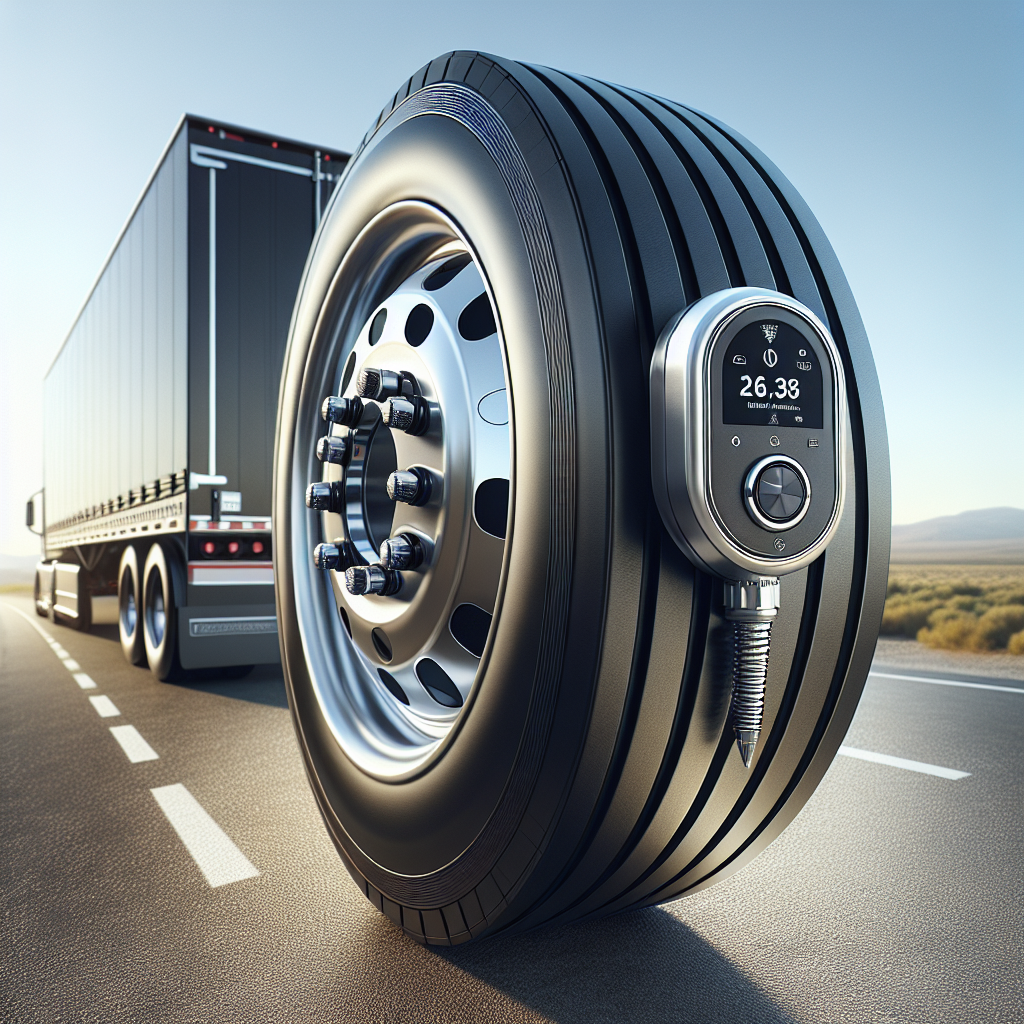

In the realm of trailer safety, Individual Trailer Tire Pressure Monitoring Systems (TPMS) have emerged as a vital component for ensuring the optimal performance of trailers. These systems serve a critical role by continuously monitoring the tire pressure of each individual tire, thus preventing potential blowouts and enhancing overall safety during transit.
Understanding how an individual trailer TPMS operates is essential for every trailer owner. These systems are equipped with sensors that are installed on each tire, providing real-time data on tire pressure levels. When the pressure drops below a predetermined threshold, the system alerts the driver with a warning signal. This proactive approach not only helps in maintaining proper tire pressure but also extends the lifespan of the tires and improves fuel efficiency.
Moreover, a well-functioning TPMS can aid in identifying other issues such as tire wear, overheating, or even alignment problems. By integrating these systems into your trailer setup, you can significantly reduce the risk of catastrophic failure events, ensuring safer journeys.
In addition to monitoring tire pressure, pairing an individual trailer TPMS with a customer-placed trailer camera can offer an enhanced view of the trailer's surroundings, further improving safety and efficiency. Together, these technologies create a comprehensive monitoring system that empowers drivers to make informed decisions on the road.
Tow with peace of mind, knowing that trailerwatchdog is standing guard.
Importance of Monitoring Trailer Tire Pressure
The importance of monitoring trailer tire pressure cannot be overstated, as it plays a crucial role in ensuring safe and efficient towing operations. Proper tire pressure is essential not only for the safety of the vehicle but also for the longevity of the tires themselves. When tires are under-inflated, they can overheat, which significantly increases the risk of tire blowouts. This can lead to dangerous situations on the road, endangering both the driver and other motorists.
Moreover, maintaining optimal tire pressure enhances fuel efficiency. Under-inflated tires create more rolling resistance, which requires more energy and fuel to operate the trailer. Conversely, properly inflated tires reduce fuel consumption, translating into cost savings for the operator. Studies have shown that maintaining correct tire pressure can improve fuel efficiency by up to 3%.
Additionally, the wear and tear on tires can be drastically reduced with consistent monitoring. Tires that are consistently inflated to the recommended pressure will degrade more slowly, providing better traction and handling. This not only helps in improving the overall driving experience but also minimizes the need for premature tire replacements, which can be a significant expense for trailer owners.
In conclusion, regular monitoring of trailer tire pressure is essential for ensuring safety, enhancing fuel efficiency, and extending the lifespan of tires. By investing in an individual trailer tire pressure monitoring system, owners can take proactive steps to safeguard their vehicles and improve their operational efficiency.
Benefits of Customer-Placed Trailer Cameras

In today's fast-paced world, customer-placed trailer cameras have become an invaluable asset for trailer owners. These cameras enhance the overall safety, security, and operational efficiency of towing operations. One of the primary benefits of installing these cameras is the ability to monitor surroundings in real-time. This provides drivers with a clear view of the trailer's rear, which is particularly useful when reversing or changing lanes, significantly reducing blind spots.
Additionally, customer-placed trailer cameras contribute to enhanced security. With the rising number of trailer thefts, having a camera system can act as a deterrent against potential thieves. Many modern cameras come equipped with motion detection and alert systems, allowing owners to receive notifications on their smartphones if suspicious activity is detected. This proactive approach to security can save trailer owners from potential losses.
Another significant advantage is the ability to capture footage during trips. This can be invaluable for insurance purposes in the event of accidents or disputes. Having video evidence can expedite claims processes and provide clarity on the circumstances surrounding incidents.
Protect your trailer
Furthermore, these cameras assist in monitoring trailer conditions during transport. With features like temperature and tire pressure monitoring integrated into the camera system, owners can ensure that their trailers are operating in optimal conditions. This combination of visual monitoring and real-time data helps in maintaining the integrity of the cargo being transported.
Overall, customer-placed trailer cameras offer a multifaceted approach to enhancing safety and security while optimizing operational performance.
Integrating TPMS with Trailer Camera Systems

The integration of an individual trailer tire pressure monitoring system (TPMS) with trailer camera systems represents a groundbreaking advancement in trailer safety and efficiency. When these two technologies work in tandem, they provide a comprehensive monitoring solution that enhances the overall performance and safety of trailer operations.
One of the primary benefits of this integration is the ability to monitor tire health in real-time while simultaneously keeping an eye on the trailer's surroundings. The TPMS continuously tracks tire pressure and temperature, alerting the driver to any irregularities before they escalate into critical issues. When combined with trailer cameras, drivers gain visual confirmation of their trailer's condition and can spot potential hazards in their vicinity.
Moreover, integrating TPMS with camera systems allows for automated alerts. For instance, if a tire's pressure drops below a safe threshold, the camera system can automatically trigger an alert to the driver, prompting immediate action. This real-time feedback loop ensures that trailer operators can respond swiftly to emerging issues, significantly reducing the risk of tire blowouts and other related accidents.
Additionally, this integrated approach can enhance analytics and reporting capabilities. By collecting data from both the TPMS and the camera system, fleet managers can analyze patterns over time, identifying potential maintenance needs and optimizing operational efficiency. Such insights can lead to better decision-making regarding tire replacements, maintenance schedules, and route planning.
In summary, the seamless integration of TPMS with trailer camera systems not only enhances safety but also empowers trailer owners with invaluable data for making informed operational decisions.
Best Practices for Trailer Tire Maintenance

Maintaining trailer tires is crucial for ensuring safety, efficiency, and longevity. Here are some best practices for trailer tire maintenance that every trailer owner should consider:
- Regular Pressure Checks: Consistently monitor tire pressure using an individual trailer tire pressure monitoring system (TPMS). Proper inflation improves fuel efficiency and reduces the risk of blowouts.
- Visual Inspections: Conduct regular visual inspections of your tires for any signs of damage, such as cracks, bulges, or foreign objects lodged in the tread. Early detection can prevent significant issues down the road.
- Tread Depth Monitoring: Ensure that tire tread depth is within safe limits. Worn-out tires can compromise traction, especially in wet conditions. Use a tread depth gauge to check this regularly.
- Rotation and Alignment: Just like with vehicles, rotating your trailer tires and checking alignment can help to achieve even wear. This practice can extend the lifespan of your tires and improve handling.
- Storage Conditions: When not in use, store your trailer in a cool, dry place away from direct sunlight. UV rays can deteriorate rubber, leading to premature tire failure.
- Regular Professional Inspections: Schedule periodic inspections with a qualified tire technician. They can provide expert assessments and recommend necessary maintenance or replacements.
By following these best practices, trailer owners can not only enhance the safety and performance of their trailers but also save on costs associated with premature tire replacements and repairs. Consistent maintenance translates to peace of mind on the road, ensuring that you can focus on your journey without worrying about tire-related issues.
Future Trends in Trailer Monitoring Technology

The landscape of trailer monitoring technology is rapidly evolving, driven by advancements in IoT (Internet of Things) and data analytics. As trailers become more integrated with technology, several future trends in trailer monitoring technology are emerging:
- Enhanced IoT Integration: Future trailer monitoring systems are expected to leverage IoT to provide real-time data on various parameters, including tire pressure, axle temperature, and load weight. This will enable fleet managers to make informed decisions and optimize operations.
- Predictive Maintenance: Advanced data analytics will allow for predictive maintenance, where systems can anticipate potential issues before they become critical. This proactive approach can lead to significant cost savings and reduced downtime.
- AI and Machine Learning: The integration of artificial intelligence and machine learning will help in analyzing vast amounts of data collected from trailers. These technologies can identify patterns and anomalies, enhancing the accuracy of alerts and recommendations.
- Mobile Applications: User-friendly mobile applications will become commonplace, providing trailer owners with instant access to monitoring data, alerts, and maintenance reminders right at their fingertips.
- Increased Focus on Safety: With growing awareness of safety, future systems will likely incorporate advanced features like driver alerts for unsafe conditions, collision avoidance systems, and enhanced visibility through customer-placed trailer cameras.
As these trends unfold, they will not only enhance the functionality of trailers but also contribute to safer and more efficient transport operations. Embracing these innovations will be crucial for trailer owners looking to stay ahead in a competitive market. Tow with peace of mind, knowing that trailerwatchdog is standing guard.




